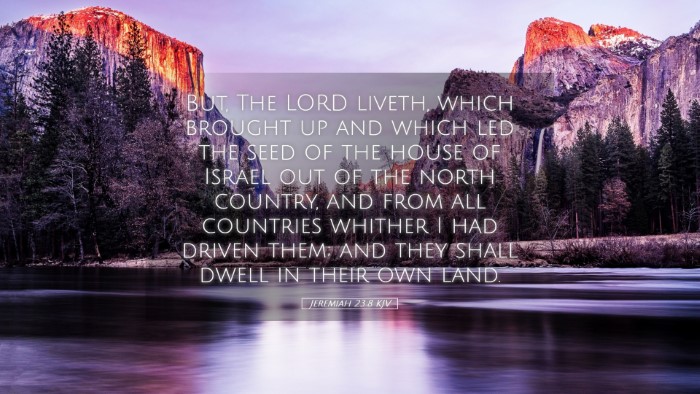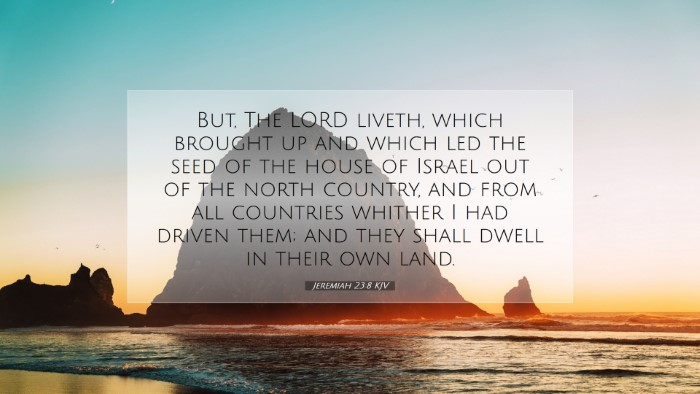Commentary on Jeremiah 23:8
Jeremiah 23:8 states:
"But the Lord liveth, which brought up and which led the seed of the house of Israel out of the north country, and from all countries whither I had driven them; and they shall dwell in their own land."
This verse serves as a poignant reminder of God's sovereignty and faithfulness in restoring His people. Throughout history, God's people have faced exile and oppression, but His promise to bring them back to their homeland remains steadfast.
Overview of Context
At the time of this proclamation, the Israelites were experiencing the consequences of their disobedience and idolatry, leading to the Babylonian exile. Jeremiah, as a prophet, was warning the people of their impending doom while also offering glimpses of hope for future restoration.
Insights from Commentaries
Matthew Henry's Commentary
Matthew Henry emphasizes the contrast between the false shepherds of Israel and the true Shepherd, the Lord Himself. He indicates that while leaders may fail, God's guidance is unwavering:
- Divine Leadership: Henry points out that God alone provides the true leadership necessary for spiritual restoration.
- Historical Context: He notes the significance of the historical deliverance from Egypt, paralleling it with the future hope of returning from exile.
- Reassurance of God’s Presence: Henry reaffirms that God’s guidance is not dependent on human priests or kings but is assured through His promises.
Albert Barnes' Exposition
Albert Barnes elaborates on the geographical implications of the text, particularly the "north country," symbolizing a place of judgment and exile:
- Symbolism of Restoration: Barnes discusses the north as a metaphor for Jerusalem’s captors, indicating that God’s restoration involves subduing even the most daunting adversaries.
- Universal Gathering: He highlights that God's promise encompasses all nations, emphasizing the global implications of Israel's restoration.
- The Nature of God’s Promises: Barnes asserts that God's fidelity is unwavering and His promises are not nullified by human sins, as exemplified in the return from exile.
Adam Clarke's Commentary
Adam Clarke adds depth to the understanding of God's deliverance as he discusses the historical fulfillment of this promise:
- Historical Fulfillment: Clarke provides insight into the return from Babylon, showcasing God’s intervention in history as a testament to His mighty power.
- Theoretical Implications: He connects Israel's future with the Christian doctrine of hope and redemption, symbolizing the ultimate return to God through Jesus Christ.
- God’s Everlasting Covenant: Clarke emphasizes God’s covenant with Israel, illustrating how He is continuously working towards the fulfillment of His promises through time.
Theological Reflections
From the combined insights of these scholars, several theological themes emerge from Jeremiah 23:8:
- Faithfulness of God: The verse reassures believers of God's unwavering nature despite the circumstances they face.
- Restorative Justice: God’s intention to restore His people reveals His character as a just and loving deity who desires reconciliation.
- Hope for All Nations: The call to return is not just for Israel but is a foretaste of the inclusivity of God’s plan extending to all humanity.
Practical Applications
For pastors, students, theologians, and scholars, Jeremiah 23:8 offers several applications:
- Hope in Despair: The assurance of God’s faithfulness can be preached as a source of hope during troubled times, both individually and collectively.
- Encouragement for Leadership: Church leaders can reflect on the nature of true leadership, which is rooted in divine guidance rather than human authority.
- Engagement with Social Justice: The call for restoration engages believers in advocating for justice and equity in their communities, mirroring God's desire for restoration.
Conclusion
In summary, Jeremiah 23:8 stands as a profound reminder of God's promise to restore and lead His people. As pastors and theologians reflect on this verse, they are encouraged to draw from the insights of esteemed biblical scholars. The hope embedded within this promise serves not only as encouragement during times of difficulty but also as a call to recognize and participate in God's ongoing work of restoration in the world.


